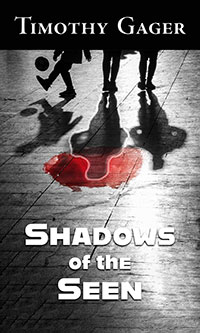 *
*
Review By Off the Shelf Correspondent Charles Felster
Timothy Gager has long been a fixture in Boston’s literary underground – a prolific writer, spoken-word regular, and a familiar face to anyone who’s spent time at the intersection of art and recovery in New England. With Shadows of the Seen, his latest and most ambitious novel to date, Gager steps fully into the national conversation with a work that confronts the psychic aftershocks of gun violence, addiction, and political hypocrisy in modern-day America.

Set in New Jersey and Tennessee, Shadows of the Seen follows four interwoven characters whose lives are quietly unraveling. The book opens with Candace, a politician whose well-curated image is shaken after a mass shooting forces her to reckon with both her platform and her past. Her storyline anchors the book, providing a moral throughline for a novel more interested in psychological depth than linear plot.
Gager, who has written candidly about his own struggles with depression and substance use, brings a clinician’s precision and a poet’s empathy into his work. Nowhere is that more evident than in the character of Lucky – a man ravaged by addiction and brain lesions, whose purpose reads not as hopelessness, but as unfiltered honesty. His chapters are not easy to read, but they are among the most affecting.
There’s also Peter, whose blackouts and panic attacks suggest a life teetering on the edge of violence. His sections simmer with dread, not because he’s a threat, but because Gager so effectively captures the experience of mental illness from the inside out – confused, circular, and terrifyingly isolating. Then there’s Bobby-Joe, a political opportunist, husband of Candace, whose self-interest serves as a foil to Candace’s late-breaking conscience. Though less nuanced than the others, he adds a necessary bite of satire to a book heavy with emotional weight.
This is not a novel that traffics in silver linings. Gager doesn’t resolve trauma, he dissects it. The structure is fragmented, the tone often bleak, and the emotional realism unflinching. That can make for a difficult read– but it’s also what makes the book feel honest. Shadows of the Seen doesn’t sensationalize mental illness or addiction; it renders them with the flat affect of lived experience.
At times, Gager’s reach exceeds his grasp. The political themes, while timely, are occasionally over-explained, and the multiple narrative voices don’t always maintain the same level of complexity. But when the novel is at its best– which is often – it pierces. The writing is sharp, direct, and deeply felt.
For readers familiar with Gager’s poetry or his personal essays, Shadows of the Seen will feel like a culmination– an artist applying his hard-won insight to fiction that dares to look at what most of us try to avoid. For new readers, it’s a bracing introduction to a voice that doesn’t flinch. In a literary market full of polished detachment, Timothy Gager is doing something riskier: he’s telling the truth, no matter how raw it is.

 https://www.portersquarebooks.com/
https://www.portersquarebooks.com/












